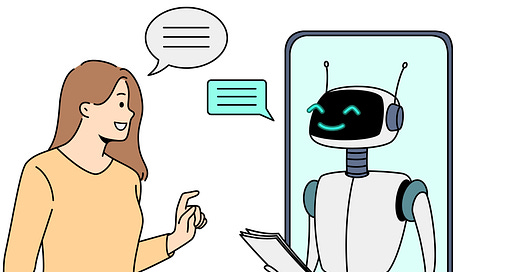AI is coming for your job…interview. Here’s what to know.
It's happening. Really. Here's how to optimize your AI job interview.
Jim Chaffee, executive director of learning innovation and technology at the University of Iowa Tippie College of Business and an AI expert, says that AI job interviews are becoming increasingly popular, whether we like it or not. Here’s his breakdown on the good and bad and do’s and don’ts should you find yourself in such an interview. Also, if your company is doing interviews via AI, here are some things to keep in mind.
This interview has been lightly edited for readability and length.
Vanessa McGrady: How prevalent are AI interviews, and which companies are doing these?
Jim Chaffee: It's not overly prevalent yet. There are a number of different businesses that are trying it out, some are a little more advanced than others. Financial companies are doing it; healthcare is doing it in different areas. There are some marketing firms that are doing it. There are probably some niche accounting firms and some large technical companies that are incorporating this.
VMc: Can you walk me through what the process of what an AI interview looks like? How does that work?
JC: In the “old” way[1], an applicant tracking system that would look for keywords and key phrases and then push that to the to the HR people. That's the way a lot of companies have been doing it and still do it. With the new way using AI interviewing, you apply and then either an applicant tracking system or an AI-enabled applicant tracking system get you pushed to the level of an interview.
Then when you have your interview, there are a bunch of different ways it could work. You could have a request where you get a request to record some responses to questions, either verbally or with a video, and then the AI system analyzes that and looks to see if you hit certain keywords, key phrases, those kinds of things.
The next level would use semantic analysis. It's looking for not just the key words, but it's actually taking the context of what you've said and it's evaluating that on what the job is looking for. For example, if you were to say, “belonging,” but the job asked for diversity, it would understand that there those are semi-synonymous.
Or, more advanced, there could be a telephone conference conversation with an AI-led interviewer, which gets recorded and evaluated using natural-language processing.
Then, the next level is either doing it through a chat bot, where you're conversing either via voice or via text. It responds to that question based on the keywords that you've said, and it's utilizing things like generative AI to create those responses.
The highest form would be an actual interview with an avatar that looks human or it could look like a cartoon character.
VMc: If you suspect or are told that your initial interview is going to be AI, is there any way you should prep your resume differently?
JC: When you're prepping your resumés for this kind of thing, the best thing to do is make sure that you are responding directly to what they're asking for in the job application. If they are looking for someone with three to five years’ experience in data analytics, you make sure you say, specifically, “I have three to five years of analytics experience,” or of data integration, or something along the lines that the AI can trigger and move you into the interview process. If you stay generic, or if you send the same resumé and cover letter out to everybody, you're not going to get the hits as well as if you really tailored those to the job.
VMc: Let's talk about the opportunity for discrimination if you have an accent, or if English is not your first language, or, if you look differently than whatever their AI is trained for. How might that affect your chances?
JC: On one hand, the AI actually can remove bias, because it doesn't pay attention to names and places where you're from or anything like that. A person could be looking at a resume and see a name that they're not familiar with and have a bias against that, where the AI does not. However, on the flip side, if you aren't a native speaker, or you have a thick accent or a speech impediment, the AI might not be able to clearly understand what it is you're saying and it could inappropriately or incorrectly score you lower because of that. That's one of the things a company has to be very careful about—what are the bias levels? How much time do you give the respondent to respond? If you one give them, say, 30 seconds to a minute to respond, and the person isn't a native English speaker or writer, that might not be enough time. But you also have to make sure not to give so much time to let Chat GPT make up the answer for them. How you balance that is part of the frustration a lot of companies are looking at when it comes to these AI systems—how do we eliminate or lessen the bias, but still get through the hundreds and hundreds and sometimes thousands of applicants we have?
VMc: It seems like AI might not be able to get a sense of the person's personality or cultural fit. Is it a serious company? Does humor help with the interviewer? Each interviewer and each candidate have a different style. Is there any way to account for that chemistry?
JC: The best way to do this is to make an initial connection to an applicant to help understand their qualifications. In my opinion, that should not be used in place of an actual interview for a job, it's just a way to get more information from the applicant in order to understand their qualifications. As an example, if a person puts down that they have three to five years’ experience in networking, and you ask them questions about different networking companies or different networking profiles or ways to do technical networking, and they have no clue, then you're pretty sure that they did not actually have that experience or they weren't as clear on their resume as they should have been. However, if they do, it makes sense is to have that personal interview for exactly the reasons you're talking about, because you can get some of the nuances of a person's personality through a visual AI interaction, but not enough at this point to make it worth losing a good candidate.
VMc: As AI becomes more prevalent, is that better or worse for job seekers?
JC: I'm not sure if I'd say it's ready just yet. One of the things we've seen with applicant tracking systems that big companies use is that there are very good, qualified applicants who are being overlooked because they didn't use the right phrase or buzzword, but AI can actually get them a little farther down the road on the on the process of getting closer to that human interview.
VMc: Could you please give us some do's and don'ts for these interviews if you happen to find yourself in one.
JC: Definitely treat this as a very official and formal interview process. Don't make light of it. A lot of people will kind of joke and say, “oh, it's AI. It's no big deal.” It's still part of the process. Take this as seriously as you can, making sure that you understand the types of questions that are going to be asked and respond appropriately. If they're asking things like, “can you tell me about a time you did x,” you don't respond with just a bunch of buzzwords. You actually say, “this is how I approached that issue…” as if you were talking to a person.
Make sure that you are prepared in case there's technical issue and you're in a good place that has good connection. Don't just go to the coffee shop and start chatting with the AI, because their wi-fi might not be as strong or it might go down. Be prepared for that.
Definitely don't try and game it. Don't try and assume the AI is going to be looking for specific things. You don't know how it was trained. You don't know what it's looking for. Just take it as a professional interview. It you treat it as if you're talking to a person, you'll be better off.
ADDITIONAL RESOURCES
Hirevue offers candidates some practice tools (some free)
Big Interview does as well (not free)
Yoodli.ai offers practice and roleplay opportunities
Google Grow offers resources to practice for interviews of all different kinds
[1] VMc: LOL. I remember buying Crane & Co. Bond Ivory Wove 20# 8.5"x11" paper and carefully printing out a resumé with my HP DeskJet and sending it with a matching cover letter and envelope and hoping for the best. Try that, Gen Z!




